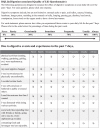Validation of a novel quality of life questionnaire: the Digestion-associated Quality of Life Questionnaire (DQLQ)
- PMID: 35346230
- PMCID: PMC8962596
- DOI: 10.1186/s12955-022-01956-4
Validation of a novel quality of life questionnaire: the Digestion-associated Quality of Life Questionnaire (DQLQ)
Abstract
Background: Few health-related quality of life (QOL) questionnaires are designed specifically for healthy populations and are specific to gastrointestinal (GI) symptoms even though healthy individuals may frequently experience gas, bloating, constipation, diarrhea, and abdominal pain. The purpose of this study was to develop and validate a tool that could assess the impact of GI symptoms on digestion-associated QOL in otherwise healthy individuals.
Methods: After a review of current literature and with input from experienced GI researchers, a 24-item questionnaire was created. The questionnaire was reduced to 9 items with input from focus groups comprised of healthy adults experiencing GI-related symptoms and through variability analysis. The Digestion-associated QOL Questionnaire (DQLQ) was designed to be sensitive to the physical and mental well-being changes that may occur due to GI symptoms. The DQLQ was assessed for internal consistency reliability (Cronbach's alpha; McDonald's omega), test-retest reliability (intraclass correlation coefficient, ICC), and construct validity (Pearson correlations) in a study with healthy, academically stressed, undergraduate students. Convergent validity was evaluated by correlating the DQLQ with gastrointestinal symptom rating scale (GSRS) scores. Divergent validity was assessed by correlating DQLQ scores with stress scores, and bowel satisfaction scores.
Results: A total of 594 students (age 18-30 years) completed the DQLQ. Internal consistency reliability was favorable (n = 594; α = 0.84, ω = 0.84). A high level of agreement and correlation between DQLQ scores was found with the test-retest reliability analysis (n = 273; ICC = 0.89). The questionnaire was shown to have good convergent validity through correlation with the GSRS (n = 594; r = 0.54). Divergent validity was also shown to be appropriate by correlating DQLQ scores with stress (n = 592; r = 0.13, p < 0.005), and bowel satisfaction (n = 592; r = 0.18, p < 0.001) scores.
Conclusion: The DQLQ is a reliable and valid questionnaire for assessing digestion-associated QOL in healthy individuals.
Keywords: Digestion; Gastrointestinal symptoms; Healthy adults; Quality of life; Validation; Well-being.
© 2022. The Author(s).
Conflict of interest statement
The authors declare that they have no competing interests.
Figures


References
-
- Patrick DL, Drossman DA, Frederick IO, DiCesare J, Puder KL. Quality of life in persons with irritable bowel syndrome: development and validation of a new measure. Dig Dis Sci. 1998;43(2):400–411. - PubMed
-
- Marquis P, De La Loge C, Dubois D, McDermott A, Chassany O. Development and validation of the Patient Assessment of Constipation Quality of Life questionnaire. Scand J Gastroenterol. 2005;40(5):540–551. - PubMed
-
- Eypasch E, Williams JI, Wood-Dauphinee S, Ure BM, Schmulling C, Neugebauer E, et al. Gastrointestinal Quality of Life Index: development, validation and application of a new instrument. Br J Surg. 1995;82(2):216–222. - PubMed
MeSH terms
Grants and funding
LinkOut - more resources
Full Text Sources

